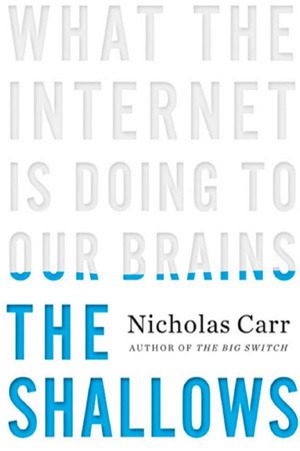Title: The Shallows: What the Internet Is Doing to Our Brains
Author: Nicholas Carr
First published June 7, 2010
280 pages, Paperback
ISBN: 9780393339758 (ISBN10: 0393339750)
Rating: 3.89
Overview
In his thought-provoking book, The Shallows: What the Internet Is Doing to Our Brains, Nicholas Carr raises a critical question: is the internet changing us? Carr takes readers on a captivating journey through the evolution of human thought, from the invention of the alphabet to the printing press, the clock, and the computer.
Drawing on recent discoveries in neuroscience, he explains how the technologies we use to find, store, and share information can reshape our brains. Carr argues that every information technology carries an intellectual ethic, and the internet’s ethic is one of speed and efficiency, encouraging us to scan and skim instead of concentrating and reflecting.
This brilliant work of intellectual history and cultural criticism offers profound insights into the state of our modern psyche and will forever alter the way we think about media and our minds.
About the Author
Meet Nicholas Carr, a renowned author known for his insightful and thought-provoking books. His works include the Pulitzer Prize finalist, The Shallows, the best-selling novel, The Big Switch, and Does IT Matter?
His latest masterpiece, The Glass Cage: Automation and Us, delves into the consequences of our increasing reliance on computers and software in our day-to-day lives. With a wealth of experience as the former executive editor of the Harvard Business Review, his writing has appeared in several prominent publications, including The Atlantic, New York Times, Wall Street Journal, and Wired.
He currently lives in Colorado and can be seen in a photo taken by Merrick Chase.
Editoral Review
Nicholas Carr’s The Shallows: What the Internet Is Doing to Our Brains offers a sobering and thought-provoking analysis of the impact of digital technology on how we think, read, and communicate. First published in 2010, the book remains a seminal work in the field of media studies, and its insights are as relevant today as they were a decade ago.
Carr, a prolific technology writer and former executive editor of the Harvard Business Review, argues that the internet has fundamentally changed the wiring of our brains, altering our ability to concentrate, remember, and contemplate deeply. He draws on a range of scientific studies, historical examples, and personal anecdotes to make his case, tracing the cultural, economic, and technological roots of our addiction to screens and instant gratification.
The Shallows is structured as a sweeping survey of the impact of various media on human cognition, starting with the invention of writing and the printing press, and ending with the rise of Google and social media. Along the way, Carr delves into the neuroscience of attention, memory, and learning, explaining how our brains are constantly reshaped by the environments we inhabit.
He argues that the internet, with its never-ending stream of distractions and multitasking demands, is rewiring us for shallowness and superficiality, eroding our capacity for sustained focus and reflection. One of the strengths of The Shallows is its clarity and accessibility.
Carr is a gifted writer who turns complex scientific concepts into vivid and engaging prose, full of metaphors, anecdotes, and humor. He manages to convey the urgency of his message without resorting to hype or scare tactics, and he balances his critique of technology with a nuanced understanding of its benefits and limitations.
Another strength of the book is its interdisciplinary scope. Carr draws on a wide range of sources, from classic works of literature to cutting-edge studies in cognitive psychology, to paint a holistic portrait of the way we think and learn.
His historical and cultural analysis is particularly insightful, showing how technological innovations have always been accompanied by fears of moral decay and intellectual decline. However, The Shallows is not without its drawbacks.
Some critics have questioned Carr’s methods and evidence, arguing that he oversimplifies the complexity of brain science and cherry-picks his examples to fit his argument. Others have accused him of nostalgia and elitism, implying that only a privileged few have the luxury of contemplative reading and reflection.
While these criticisms are not unfounded, they do not detract from the overall value of The Shallows as a wake-up call to the dangers of digital distraction and information overload. Carr’s thesis continues to resonate with a wide audience, from educators and parents to policymakers and technologists.
The book has inspired lively debates and discussions in classrooms, boardrooms, and living rooms around the world, and its message is more urgent than ever in the era of social media bots, fake news, and filter bubbles. In conclusion, The Shallows is a must-read for anyone interested in the impact of technology on human behavior and society.
It is a well-researched, engagingly written, and intellectually stimulating work that challenges us to rethink our assumptions about the trade-offs between convenience and cognition. While it may not offer easy solutions to the problems it highlights, it provokes us to reflect on our own habits and values, and to cultivate a more mindful and intentional relationship with the digital world.
Washington Post gives the book four out of five stars.



